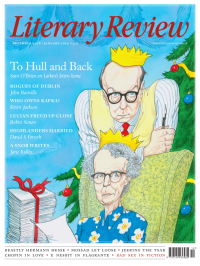Gillian Tindall
Not for Children
The Extraordinary Life of E Nesbit
By Elisabeth Galvin
Pen & Sword 182pp £19.99
When Doris Langley Moore wrote the first biography of Edith Nesbit, some nine years after the beloved children’s author had died in 1924, much of the material she uncovered had to be supressed. It was too soon, it was felt, to reveal what an unconventional private life had been led not only by the creator of The Railway Children and Five Children and It but also by her husband, the equally successful but soon-forgotten Fabian and journalist Hubert Bland. Time brought social change, of course – something both Edith and Hubert were keen on – and by the 1980s Julia Briggs felt able to write a well-researched and thorough biography, exploring the many apparent contradictions in Nesbit’s redoubtable personality and variegated behaviour.
I can see why Elisabeth Galvin, new to biography I think, has felt it time for a fresh look at the subject, and it is bad luck both on her and on another author, Eleanor Fitzsimons, that they have had the same idea at the same time, though

Sign Up to our newsletter
Receive free articles, highlights from the archive, news, details of prizes, and much more.@Lit_Review
Follow Literary Review on Twitter
Twitter Feed
Under its longest-serving editor, Graydon Carter, Vanity Fair was that rare thing – a New York society magazine that published serious journalism.
@PeterPeteryork looks at what Carter got right.
Peter York - Deluxe Editions
Peter York: Deluxe Editions - When the Going Was Good: An Editor’s Adventures During the Last Golden Age of Magazines by Graydon Carter
literaryreview.co.uk
Henry James returned to America in 1904 with three objectives: to see his brother William, to deliver a series of lectures on Balzac, and to gather material for a pair of books about modern America.
Peter Rose follows James out west.
Peter Rose - The Restless Analyst
Peter Rose: The Restless Analyst - Henry James Comes Home: Rediscovering America in the Gilded Age by Peter Brooks...
literaryreview.co.uk
Vladimir Putin served his apprenticeship in the KGB toward the end of the Cold War, a period during which Western societies were infiltrated by so-called 'illegals'.
Piers Brendon examines how the culture of Soviet spycraft shaped his thinking.
Piers Brendon - Tinker, Tailor, Sleeper, Troll
Piers Brendon: Tinker, Tailor, Sleeper, Troll - The Illegals: Russia’s Most Audacious Spies and the Plot to Infiltrate the West by Shaun Walker
literaryreview.co.uk